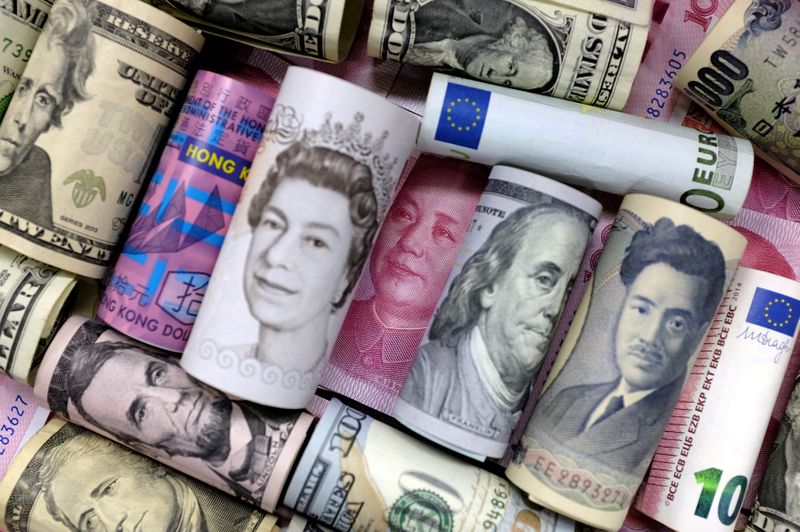
FILE PHOTO: Euro, Hong Kong dollar, U.S. dollar, Japanese yen, pound and Chinese 100 yuan banknotes are seen in this picture illustration, January 21, 2016. REUTERS/Jason Lee/Illustration
May 6, 2020
By Olga Cotaga
LONDON (Reuters) – The euro resumed its decline on Wednesday and the Japanese yen reached a seven-week high against the U.S. dollar after a court decision challenged German participation in the euro zone’s stimulus programme.
Germany’s highest court on Tuesday gave the European Central Bank three months to justify purchases under its bond-buying programme, or lose the Bundesbank’s participation in one of its main stimulus schemes.
The euro fell to a near two-week low of $1.0786 on Wednesday <EUR=EBS>. The common currency was last down 0.4% at $1.0795.
For a graphic on Euro falls yen rises on fears of economic glut, click https://fingfx.thomsonreuters.com/gfx/mkt/xegvbkjbwpq/Euro%20falls%20yen%20rises%20on%20fears%20of%20economic%20glut.png
The ECB is expected to be able to justify its bond purchases, so the German court decision is unlikely to derail the euro zone’s stimulus efforts. But the uncertainty is only the latest strain on Europe’s teetering coronavirus response and undermines the euro zone project and the euro.
Athanasios Vamvakidis, head of G10 currency strategy at Bank of America Merrill Lynch, said he expected the euro to weaken further amid a weaker global outlook, a more severe euro zone recession than others expect, a weaker euro zone macro policy response and low oil prices.
Euro zone business activity almost ground to a halt last month as government-imposed lockdowns to stop the spread of the coronavirus forced factories, shops and restaurants to close and recreation to cease, a survey showed.
In addition, retail sales in the euro zone suffered their largest decline on record in March.
The fact that speculators are now long the euro also undermines its current levels, Vamvakidis said. Leveraged funds have trimmed their long positions on the euro, but the number of longs is still close to their two-year highs. <EURNETUSD=>
For a graphic on Leverages funds remain broadly long euro, click https://fingfx.thomsonreuters.com/gfx/mkt/bdwpkrkqbvm/Leverages%20funds%20remain%20broadly%20long%20euro.png
“We expect euro/dollar to weaken in the months ahead,” Vamvakidis said, adding that the saw the euro falling to as low as between $1.02 and $1.05 “with risks to the downside.”
A declining euro helped Scandinavian currencies regain some strength. The Swedish crown rose to a two-month high versus the euro <EURSEK=D3> and the Norwegian crown reached a one-month high against the euro <EURNOK=D3>.
The yen rose 0.2% to 106.20, its strongest since March 17 <JPY=EBS>.
(Reporting by Olga Cotaga, editing by Larry King)

